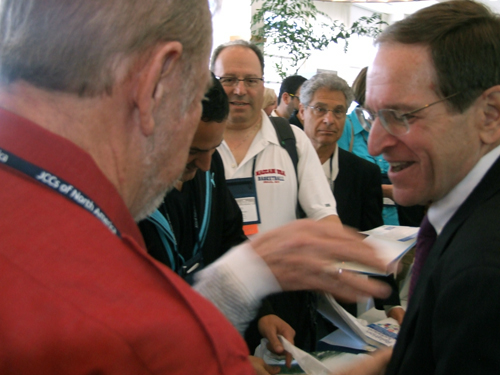
By Donald H. Harrison

SAN DIEGO – If JCC’s across North America desire to assure their longevity, they need to switch from “transactional” institutions to ones that build relationships among their members, Education Prof. Ron Wolfson of American Jewish University told delegates Sunday, March 30, at the Jewish Community Center Association of North America’s biennial meeting here.
Wolfson said JCC’s need to move beyond simply offering good facilities and good programming. “Let’s be honest, why should I join a JCC today when I have so many other options?” asked Wolfson. He pointed out that there are many choices of preschools in most communities. There also are many gyms competing with the fitness facilities offered by JCC’s. Jewish learning? “With a click of a mouse I can get any Jewish information I want..”
So, if the JCC simply is selling its services, some people will join, other people will leave, and the net effect will be that people will treat JCC membership like any other business transaction. If JCC’s are to be more successful, Wolfson said, they must build relationships between members and the staff, between members and other members, and between members and the Jewish world.
One very good model to study is the worldwide success of Chabad, he said. The Lubavitcher Chasidic organization knows how to build relationships. “You meet a Chabad rabbi and in five minutes you are invited to his home for Shabbat dinner or lunch. In five minutes you are invited to sit and study Torah. They raise more than $1 billion per year from people like you and me, not from Orthodox Jews – people who are grateful for the relationships they have….”
Wolfson offered a number of tips to help Jewish Community Centers develop life-long relationships with their members, and not simply a transactional business relationship. Among tips mentioned at a morning plenary session at the Hilton Bayfront Hotel, were the following:
1. Personal encounters. Members should be greeted at the JCC not just by security guards or the front-desk person, but by every member of the JCC staff they meet. Have cleverly named cafes where people can sit down and schmooze – some examples: “Java Nagila;” “Holy Grounds” or “Me ka Mocha.” Listen to people’s stories—hear what they have to say. Shm’a Israel – Listen Israel.
2. Connect new people to each other as soon as they join the JCC. “The goal,” said Wolfson, “is to connect every new member to 5 or 7 friends at the J.” These could be people at the fitness club, or such natural affinity groups as the parents of pre-school students. “Encourage them to spend time to get to know each other, and once they get to know each other, they will feel more connected and be willing and able to support the place financially.” He added the maxim that “connection comes before commitment.”
3. “Every experience we offer must have cognitive content, what people will learn; affective feeling, what people will feel; and social connection that will connect people to each other and the community.”
4 Enlist volunteers with short-term projects. “Once they are successful, you can call on them again.”
5. Follow up. JCC’s, said Wolfson, “do a terrible job following up. We don’t track our interactions. We don’t communicate with them after a personal encounter. We might send them an email blast but who reads them?”
6. Transitions. Preschool parents must be attracted to other JCC programs. Members of the fitness club should be invited to take advantage of educational opportunities at the J. “How do we avoid the silos in our buildings when our staff barely know each other, much less what each other is doing? Where is the concierge in the JCC, the membership director, better yet, the ‘relationship director, who knows everyone well, knows their stories, their interests and their passions and can connect them to those things?”
Wolfson said there is much discussion in the Jewish community about replacing “dues models.” These essentially say to prospective members, “pay first and then maybe we will pay attention to you.” Like Chabad, JCC’s should be building relationships from the very first meeting, Wolfson said.
Author of the book Relational Judaism: Using the Power of Relationships to Transform the Jewish Community, Wolfson stressed a belief that throughout the North American network of JCCs. there must be a “paradigm shift from transactional to relational.”
*
Donald H. Harrison is editor of San Diego Jewish World, which seeks sponsorships to be placed, as this notice is, just below articles that appear on our site. This is an ideal opportunity for your corporate message or to personally remember a loved one’s contributions to our community. To inquire, call editor Donald H. Harrison at (619) 265-0808 or contact him via donald.harrison@sdjewishworld.com
JCC’s need to remember they are primarily JEWISH centers catering to a diverse population. One main issue of concern to me is the level of kashrus – kosher food availability at the JCC’s. Everyone can eat non-Kosher food but people who observe Kashrus can only eat kosher food. It behooves JCC to have a kosher kitchen under Rabbinical supervision. Where that is not feasible at least have pre-packaged kosher food and snacks available.
JCC’s need to offer transportation where public transportation is not available, and for people who cannot avail themselves of public transportation. Transportation should be made available for social, educational, cultural, as well as nutrition programs.
Innovative programming needs to be developed for people of all age groups. Rethink hours of operation; maybe go to a 24/6 schedule (being closed on Shabbat and Jewish holidays). Events and memberships need to be affordable.
Good article! Put a finger right on why I am skeptical about joining any organization with a large ” facility.”